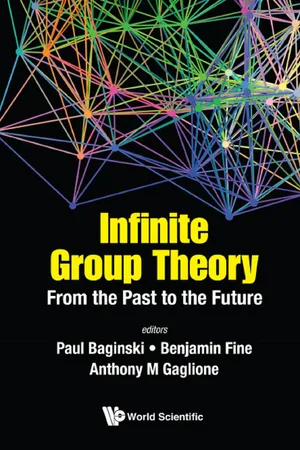
eBook - ePub
Infinite Group Theory
From the Past to the Future
Paul Baginski, Benjamin Fine;Anthony M Gaglione
This is a test
Buch teilen
- 260 Seiten
- English
- ePUB (handyfreundlich)
- Über iOS und Android verfügbar
eBook - ePub
Infinite Group Theory
From the Past to the Future
Paul Baginski, Benjamin Fine;Anthony M Gaglione
Angaben zum Buch
Buchvorschau
Inhaltsverzeichnis
Quellenangaben
Über dieses Buch
-->
The development of algebraic geometry over groups, geometric group theory and group-based cryptography, has led to there being a tremendous recent interest in infinite group theory. This volume presents a good collection of papers detailing areas of current interest.
--> Contents:
- Groups with the Weak Minimal Condition on Non-Permutable Subgroups (Laxmi K Chatuat and Martyn R Dixon)
- A Survey: Shamir Threshold Scheme and Its Enhancements (Chi Sing Chum, Benjamin Fine, and Xiaowen Zhang)
- The Zappa-Szep Product of Left-Orderable Groups (Fabienne Chouraqui)
- Totally Disconnected Groups From Baumslag-Solitar Groups (Murray Elder and George Willis)
- Elementary and Universal Theories of Nonabelian Commutative Transitive and CSA Groups (B Fine, A M Gaglione, and D Spellman)
- Commutative Transitivity and the CSA Property (Benjamin Fine, Anthony Gaglione, Gerhard Rosenberger, and Dennis Spellman)
- The Universal Theory of Free Burnside Groups of Large Prime Exponent (Anthony M Gaglione, Seymour Lipschutz, and Dennis Spellman)
- Primitive Curve Lengths on Pairs of Pants (Jane Gilman)
- Drawing Inferences Under Maximum Entropy From Relational Probabilistic Knowledge Using Group Theory (Gabriele Kern-Isberner, Marco Wilhelm, and Christoph Beierle)
- On Some Infinite-Dimensional Linear Groups and the Structure of Related Modules (L A Kurdachenko and I Ya Subbotin)
- On New Analogs of Some Classical Group Theoretical Results in Lie Rings (L A Kurdachenko, A A Pypka and I Ya Subbotin)
- Log-Space Complexity of the Conjugacy Problem in Wreath Products (Alexei Myasnikov, Svetla Vassileva, and Armin Weiss)
- Group Presentations, Cayley Graphs and Markov Processes (Peter Olszewski)
-->
--> Readership: Graduate students and researchers in group theory. -->
Keywords:Infinite Group Theory;Combinatorial Group Theory;Geometric Group TheoryReview: Key Features:
- This book is centered on infinite group theory from a combinatorial and geometric point of view. It also contains material on non-commutative algebraic group-based cryptography
Häufig gestellte Fragen
Wie kann ich mein Abo kündigen?
Gehe einfach zum Kontobereich in den Einstellungen und klicke auf „Abo kündigen“ – ganz einfach. Nachdem du gekündigt hast, bleibt deine Mitgliedschaft für den verbleibenden Abozeitraum, den du bereits bezahlt hast, aktiv. Mehr Informationen hier.
(Wie) Kann ich Bücher herunterladen?
Derzeit stehen all unsere auf Mobilgeräte reagierenden ePub-Bücher zum Download über die App zur Verfügung. Die meisten unserer PDFs stehen ebenfalls zum Download bereit; wir arbeiten daran, auch die übrigen PDFs zum Download anzubieten, bei denen dies aktuell noch nicht möglich ist. Weitere Informationen hier.
Welcher Unterschied besteht bei den Preisen zwischen den Aboplänen?
Mit beiden Aboplänen erhältst du vollen Zugang zur Bibliothek und allen Funktionen von Perlego. Die einzigen Unterschiede bestehen im Preis und dem Abozeitraum: Mit dem Jahresabo sparst du auf 12 Monate gerechnet im Vergleich zum Monatsabo rund 30 %.
Was ist Perlego?
Wir sind ein Online-Abodienst für Lehrbücher, bei dem du für weniger als den Preis eines einzelnen Buches pro Monat Zugang zu einer ganzen Online-Bibliothek erhältst. Mit über 1 Million Büchern zu über 1.000 verschiedenen Themen haben wir bestimmt alles, was du brauchst! Weitere Informationen hier.
Unterstützt Perlego Text-zu-Sprache?
Achte auf das Symbol zum Vorlesen in deinem nächsten Buch, um zu sehen, ob du es dir auch anhören kannst. Bei diesem Tool wird dir Text laut vorgelesen, wobei der Text beim Vorlesen auch grafisch hervorgehoben wird. Du kannst das Vorlesen jederzeit anhalten, beschleunigen und verlangsamen. Weitere Informationen hier.
Ist Infinite Group Theory als Online-PDF/ePub verfügbar?
Ja, du hast Zugang zu Infinite Group Theory von Paul Baginski, Benjamin Fine;Anthony M Gaglione im PDF- und/oder ePub-Format sowie zu anderen beliebten Büchern aus Matematica & Teoria degli insiemi. Aus unserem Katalog stehen dir über 1 Million Bücher zur Verfügung.
Information
Thema
MatematicaThema
Teoria degli insiemiChapter 1
Groups With the Weak Minimal Condition on Non-Permutable Subgroups
ABSTRACT. Let G be a group with the weak minimal condition on non-permutable subgroups. The main results are as follows. If G is locally finite then either G is quasihamiltonian or G is Chernikov; if G is a generalized radical group then G is either quasihamiltonian or soluble-by-finite of finite rank.
1.Introduction
In this paper, we shall often be concerned with the well-known class of generalized radical groups. Here a group G is called generalized radical if it has an ascending normal (indeed characteristic) series,

where Rα+1/Rα is either locally nilpotent or locally finite, for each ordinal α and Rλ = ∪β<λ Rβ, for each limit ordinal λ.
Other well-studied classes of groups which are of relevance in this paper are the class of groups with the minimal condition and the class of groups with the maximal condition, which we briefly discuss. Shunkov [23] proved that a locally finite group with the minimal condition is Chernikov and it is then an easy consequence to show that every generalized radical group with the minimal condition is Chernikov, a result which can be substantially generalized still further.
The maximal condition is well-known to be equivalent to the condition that every subgroup of G is finitely generated and from this it is easy to deduce that a soluble group with the maximal condition is polycyclic. Consequently a generalized radical group with the maximal condition is polycyclic-by-finite. However, even residually finite groups with the maximal condition do not appear to be well-understood.
Of course, once we leave the realm of generalized radical groups, classification problems often become much more difficult. The well-known Tarski Monsters of Ol’shanskii [17], for example, have both the maximal condition and the minimal condition.
One generalization of both the maximal and minimal conditions that has proved useful is the condition of being minimax. A group G is called minimax if it has a finite series each of ...